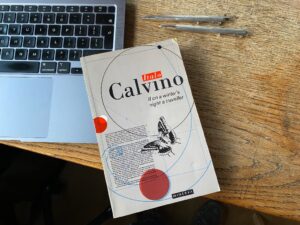Deep Waters

Every time I embark on reading Foucault I think of this sign.
Quote of the Day
”I went to a fight the other night and an Ice Hockey game broke out.”
Musical alternative to the morning’s radio news
Bach | Goldberg Variations, BMV 998 (Zenph re-performance)
Link
I’ve had the most amazing — and fascinating — correspondence following my suggestion that readers might like to compare Lang Lang’s recent recording of the Goldburg variations with a Glen Gould recording. It turns out that there’s a long story behind that.
Seb Schmoller (Whom God Preserve) wrote to say that my suggestion had him listening again to Gould’s 1981 (swansong) version of the Goldberg Variations, then finding his 1955 (start of career) recording, and then coming across this ‘Slate’ article, which comments on both.
The ‘Slate’ piece is fascinating:
With a couple of trivial exceptions, plus one that’s absolutely gigantic, pianist Glenn Gould never recorded the same piece twice. Unlike, say, Rudolf Serkin, who as his ideas evolved made it a practice to revisit certain key masterpieces, Gould preferred to document one interpretation and never look back.
This comports with his decision, taken in 1964, not to perform in public any more. Unlike every other virtuoso of the past 300 years, Gould didn’t have to go from city to city with the same bundle of dependable war horses in his satchel, playing them over and over. Instead, he would occasionally venture out of his hermitic Toronto apartment very late at night, drive to a studio a few miles away, and there, working in virtual solitude, record and edit a piece until he was satisfied. And that would be that.
The one significant exception to this rule is Bach’s Goldberg Variations, which he recorded twice. The first recording, from 1955, was his major-label debut and instantly made him an international star. The second, from 1981, was, eerily enough, his swan song, the last recording he ever made. Critical opinion of the first release is close to unanimous: It’s considered a milestone in Bach performance and one of the greatest keyboard recordings ever made. The second enjoys a somewhat rockier reputation, although it has its passionate champions.
And then Greg Jeffreys took time off from his holiday to write about the Zenph remastering of the 1955 performance — which is the one linked to above.
The original 1955 version was the revelation that made his name and re-established the piece itself into the canon. It’s perfect in its own way, but with technical limitations plus his own annoying croonings and his signature squeaky piano stool.
The Zenph remastering technique is radically different from the usual ones. The NYT piece mentioned by Greg gives chapter and verse.
Many thanks to everyone who contributed to my musical education this week.
Long Read of the Day
Lost in Space
Terrific essay in the Boston Review by my colleague Alina Utrata.
Billionaires such as Elon Musk and Richard Branson peddle the idea that space represents a public hope, all the while reaping big private profits. If you’ve ever wondered why Musk, Bezos, Branson & Co are obsessed with extra-planetary ventures, then there’s lots for you here.
The results you get from Google search depend on where you are
Great story in Wired about a remarkable piece of research by Rodrigo Ochigame and Katherine Ye.
Google’s claim to “organize the world’s information and make it universally accessible and useful” has earned it an aura of objectivity. Its dominance in search, and the disappearance of most competitors, make its lists of links appear still more canonical. An experimental new interface for Google Search aims to remove that mantle of neutrality.
Search Atlas makes it easy to see how Google offers different responses to the same query on versions of its search engine offered in different parts of the world. The research project reveals how Google’s service can reflect or amplify cultural differences or government preferences—such as whether Beijing’s Tiananmen Square should be seen first as a sunny tourist attraction or the site of a lethal military crackdown on protesters.
Divergent results like that show how the idea of search engines as neutral is a myth, says Rodrigo Ochigame, a PhD student in science, technology, and society at MIT and cocreator of Search Atlas. “Any attempt to quantify relevance necessarily encodes moral and political priorities,” Ochigame says.
Like Google’s homepage, the main feature of Search Atlas is a blank box. But instead of returning a single column of results, the site displays three lists of links, from different geographic versions of Google Search selected from the more than 100 the company offers.
An obvious demonstration is searches for “Tiananmen Square” — with results that you might predict.
More interesting, though, is a search for “God”. In Japan, the results emphasize Shinto spirits (kami). In the United Arab Emirates, they point exclusively to Islamic sources. In the United States, they refer exclusively to a monotheistic Christian god.
A lovely example of relevant, illuminating academic research.
Two great videos
Well, it is the weekend…
-
The secret life of the photocopier A remastered video from Tim Hunkin’s original TV series. Link
-
Joel Meyerowitz on His Summers Photographing in Provincetown Joel is the world’s most distinguished street photographer. This lecture is about what he learned from spending summers in Provincetown, Mass. taking portraits with a huge 10×8 View camera. It’s gentle, thoughtful, sometimes profound. And, if you’re a photographer, like me, just wonderful. Link
This blog is also available as a daily email. If you think this might suit you better, why not subscribe? One email a day, Monday through Friday, delivered to your inbox at 7am UK time. It’s free, and there’s a one-click unsubscribe if you decide that your inbox is full enough already!










